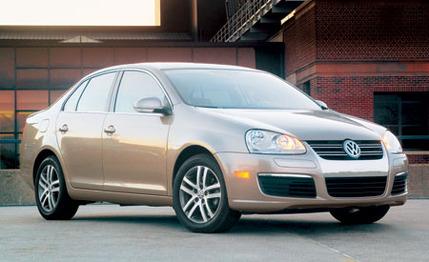 Short Take Road Test
Short Take Road Test
There are only two new cars in the U.S. market into which one can introduce diesel fuel without provoking costly damage: the $51,825 Mercedes-Benz E320 CDI and the $22,235 Volkswagen Jetta TDI. When 2007 rolls around and more stringent emissions requirements finish phasing in, we may find ourselves with just the Benz. Mercedes has shown us its particulate-filter-equipped and 2007-compliant E320 BlueTec, but Volkswagen hasn't revealed what it's doing to comply with the stricter standards. Presumably, VW will follow Mercedes and add similar technology to clean up the exhaust; however, VW has conceded that a 2007 diesel Jetta might not be ready here by the beginning of the year. If VW diesels are your bag, you're not entirely out of luck. The German automaker may stockpile 2006 Jetta TDIs, which it will sell into the 2007 calendar year until a true, emissions-compliant 2007 model is ready.
In September 2004, we pitted a Jetta TDI of the previous generation against its gas-sipping competition, and although the Jetta wasn't the quickest or most fuel efficient of the bunch, it offered a nearly gas-like experience while delivering 42 mpg on our highway loop and 33 mpg around town. The same fuel-conscious 100-hp, 1.9-liter turbocharged diesel four-cylinder that was under the hood of the aforementioned Jetta is carried over to the latest Jetta TDI. Now in its fifth generation, the Jetta has grown in size, refinement, sophistication, and price. A 200-hp GLI version of the Jetta even won a comparison test ("Everyday Heroes," February 2006), beating out two 10Best winners. So the question before us now is: How does the Jetta acquit itself when it has only half the horsepower?
If you're not interested in stoplight drag races, there's very little that says diesel about the TDI. There is a trace of turbo lag from a stop, which can be seen in the longish 11.6-second 5-to-60-mph run, but a more aggressive launch reduces the time to 10.3 seconds. The Jetta's 177 pound-feet of torque and optional six-speed dual-clutch Direct Shift Gearbox keep the power available and give the impression that there are more than 100 horses underhood.
In park, the only telltale that you're in a diesel Jetta is the 4500-rpm redline on the tachometer and the glow-plug light — it looks like a fusilli noodle — that briefly illuminates when you start the engine. There's no waiting for the glow plugs — just hop in and turn the key. When the engine is cold, a bit of diesel clatter can be heard from inside the cabin, but once the engine is warm, there is mostly a mellow hum with only the slightest hint of the characteristic percolator-like gurgling. At idle it's a bit louder than the gas Jettas we've tested. At speed, the engine note moves into the background to the tune of 68 decibels at 70 mph — two more than the regular Jetta and two less than the GLI.
Don't tell your passengers they're in a diesel and it's unlikely they'll ever suspect there is anything unusual about your Jetta. Since diesel pumps are inevitably coated in diesel fuel, they might wonder why you smell like a trucker, but that's not the car's fault.
Despite our alpha driver tendencies — gotta be in front, gotta be in front — the TDI returned 36 mpg, which translates into a heady 522-mile range (the EPA highway number of 42 mpg equals 609 miles between stops). Jetta TDI drivers interested in running the tank empty in one sitting should consider the Stadium Pal or the Stadium Gal (www.stadiumpal.com).
The Jetta TDI is so adept at hiding its weird side that hybrid cross-shoppers who revel in the statement and odd nature of their vehicles might be turned off by its unabashedly carlike personality. Volkswagen's diesel is an affordable, fuel-efficient car — never a hybrid spaceship — yet it retains enough diesel traits to keep things interesting. We're hoping VW finds a way to keep selling it.